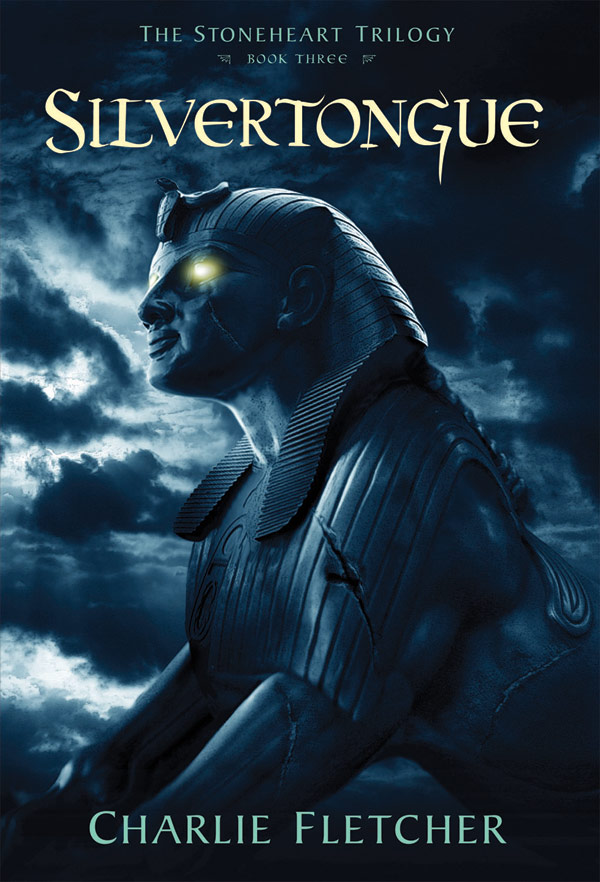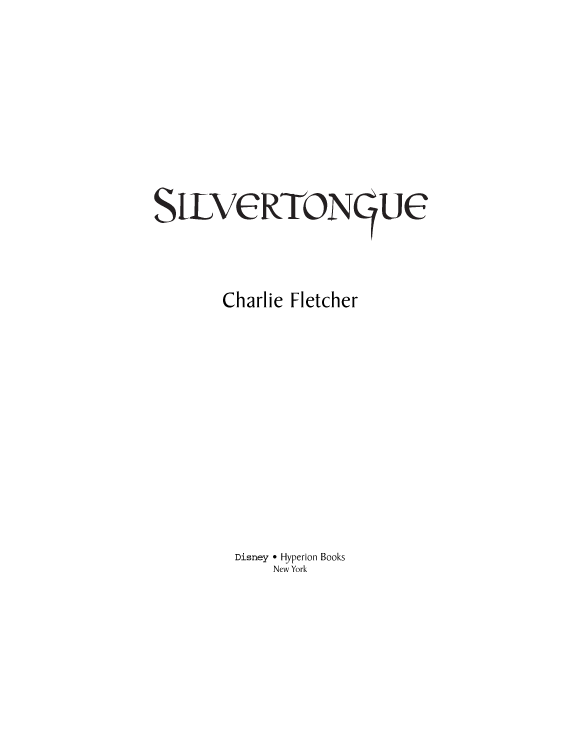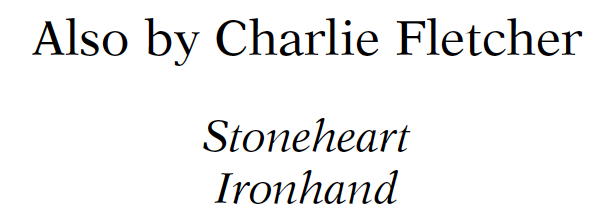Silvertongue



Text copyright © 2008 by Charlie Fletcher
First published in the U.K. by Hodder Children’s Books
All rights reserved. Published by Disney • Hyperion Books, an imprint of Disney Book Group. No part of this book may be reproduced or transmitted in any form or by any means, electronic or mechanical,
including photocopying, recording, or by any information storage
and retrieval system, without written permission from the publisher.
For information address Disney • Hyperion Books,
114 Fifth Avenue, New York, New York 10011-5690.
Printed in the United States of America
First U.S. edition, 2009
1 3 5 7 9 10 8 6 4 2
Library of Congress Cataloging-in-Publication Data on file.
ISBN 978-1-4231-0179-6
Reinforced binding
- Other Books By This Author
- The Ice Devil
- Chinstrapped
- Touch Not The Cat
- A Fire In The Dark
- Night Patrol
- Death By Drowning
- The Dark Horse
- Death At The Beach
- Dark Horse, Black Tower
- In Shtuck
- Dark Knight
- The Cold Light Of Morning
- Lost In The Murk
- Red Thread
- Love Lies Bleeding
- Anteros
- The Gathering
- The Riddle Of The Sphinxes
- The Queen Of Time
- The Wrong Question
- Dogfight
- Edie's Question
- Catcher's Mitt
- A Matter Of Life Or Death
- Double Dragon
- A Trap Worth Walking Into
- Buffalo Girl
- The Machine Of Times And Places
- Stonearm
- Meat And Drink
- Lost Girl
- The Pit
- Mile Zero
- Gunner To Black Friar
- Club Death
- Voices In The Dark
- Southwark
- Message In A Bottle
- The Lone Dragon
- The Stone Corpse
- On The Bench
- The Impossible Bridge
- Back To The Beach
- Darkness Invincible
- Walker On The Beach
- Hare Bell
- Divers
- Asylum
- Ambush
- A Matter Of Death And Life
- An Unexpected Ally
- The High Admiral
- First Wave
- The Old Growler
- Ground Assault
- The Death Of Water
- Divide And Conquer
- No Retreat, No Surrender
- Last Stand
- Spit Fire
- The High Citadel
- Twist In The Tail
- Acknowledgments



The Ice Devil
T
he Ice Devil swirled in over the City, reveling in this new otherworld it had found. It sensed the lines of power and the old places of magic buried beneath the thin skin of the modern streets and buildings, and as it rose higher it tried to make sense of what it was experiencing.
The first thing it noticed as it crashed into this unfamiliar dimension was the dark pulse just barely contained in the London Stone. The Stone, set behind a wrought-iron screen in the side of an undistinguished building on Cannon Street, looked like nothing important. Only the tiniest percentage of the thousands of normal people who walked past it every day actually noticed it, and of those who did, none sensed the malevolence imprisoned within the rough block, or realized that the flaking iron cage was there to protect them from the Stone, rather than the other way around. But the Ice Devil was not “normal people”; it was “other.” It had come through the black mirror from a dimension wholly and implacably different to ours, and was attuned to a very different register of forces. To the Ice Devil the darkness in the Stone blazed out like a flaming beacon on a starless night, and that was why it had made straight there to get its bearings.
What it hadn’t expected was the effect of its sudden arrival: the ice that it had made its shape out of was in fact only half as cold as the otherworldly chill that was its normal state, and when the Stone met the shocking subzero blast that attended it, it cracked. And when it cracked, the true power and depth of the darkness within made itself apparent. If the darkness had been light, then it would have been a blinding flare of whiteness. The darkness revealed through the crack in the Stone was the purest, most malevolent gloom, a sinister dark pitched far beyond black. It was not a darkness made from the mere absence of light and hope, it was the darkness that actively sucked light, hope, and life into it and obliterated them.
The Ice Devil recoiled from the darkness, surprised at the power it had released by cracking the Stone. It soared up and away into the night, and came to rest on the highest perch it could find: the black blockhouse structure on top of Tower 42, a tall triangular skyscraper on Old Broad Street. It was on this bunker in the sky that the Ice Devil waited as it surveyed the City beneath and got its bearings, never forgetting to keep part of its consciousness on the darkness below. And the darkness also waited, looking back out of the crack in the Stone, waiting to take shape, in no hurry now that the doors to its long prison stood open.
And then their looks met.
What passed between them was nothing more cataclysmic than a nod and a tiny flicker of kinship. And something as delicate as laughter dropped cold and soft from the Ice Devil and joined the heavy snow starting to fall on the city below.
One command, pitched below sound but audible to every Stone Servant and taint in the city, boomed out through the night: “COME!”
Chinstrapped
“W
here have the people gone?” said Edie, voicing the question in George’s head. “Why’s everything frozen?”
George tried to ignore the insistent twinge of pain in his arm, where he knew the vein of stone was inexorably twisting toward his shoulder, and looked at the unmoving traffic curving around the uphill bend of Hyde Park Corner. The cars and buses were empty of drivers or passengers, and a riderless police motorbike was stuck leaning forty-five degrees into the turn behind them, as if kept upright by invisible strings.
“And why’s it snowing?” asked George, looking around at the Gunner.
The Gunner shrugged snow off his shoulders and looked at the Officer. The Officer cleared his throat and looked up into the sky at the fall of thick, fluffy flakes tumbling straight down on them out of the sodium glare that ceilinged the city.
“Well. Ahem. I should say it’s, ah . . .”
“Gack,”
said Spout, hopping down off the stone howitzer above them, landing in the snow already stacking up at their feet.
“Exactly,” finished the Officer. “I don’t know.”
“How can you not know?” asked George. “You must know!”
He followed the Officer’s gaze into the night sky and then turned slowly, scouring what he could see of the city for anything reassuring, like someone hurrying home along a pavement, or people moving in the lighted windows of the hotel opposite. There was nothing.
“We don’t,” said the Red Queen.
“You don’t?” said Edie shakily.
“No,” replied the Gunner. “This hasn’t happened before.”
George stopped turning and looked at the statues standing around him in the increasingly white cityscape. The two World War I soldiers had snow massing on their tin helmets, and the Red Queen and her two daughters looked entirely underdressed for the eerily sudden winter tumbling down around them. The horses attached to her chariot nickered in the background and tossed white flakes from their manes, eyeing Spout, the winged gargoyle, with suspicion. Even without the snow, it was a strange sight.
“Great,” George sighed. He knew three things with equal conviction and clarity:
He knew they were in deep trouble.
He knew that whatever that trouble was, they had somehow brought it with them through the mirrors from the Frost Fair.
And he knew he was in no shape to begin to figure it out. The white stone vein twining up his arm was not just counting off the time he had left to face the unavoidable doom of his third and final duel, but it was also remorselessly draining his remaining energy, drip by tiny drip.
“I’m knackered,” he said.
“Knackered?” shot back the Queen in surprise. “What is knackered?”
“Chinstrapped,” said the Gunner.
“Exhausted,” explained the Officer. “As in the only thing holding him up on his feet is the chinstrap on his helmet. It’s not surprising.”
Edie looked around at them, and then down at her mother’s sea-glass earring clenched in her hand. She felt a deep and private pain, one that she’d never allowed herself. It was the pain of hoping against hope, a confusing ache of elation and fear spreading through her so fiercely that she almost couldn’t breathe. It felt like she was drowning in “maybes,” because the light in that little fragment of glass shouted that maybe things were not as she had thought them to be, that maybe she had been lied to, maybe the great hole in her heart would again be filled with the thing she thought had abandoned it, and maybe, just maybe, she would not have to carry the pain alone and forever.
“We can’t just go to sleep,” she said. “We’ve got things to do. . . .”
“The thing about having things to do,” declared the Gunner, “is that before you start, it’s a good thing to have some idea about what they are and how you’re going to do ’em.”
“I’m going to find my mother,” retorted Edie, jutting her chin as if daring him to say no.
A look ricocheted from the Gunner to the Queen to the Officer.
“Er,” said the Officer.
“Fair enough,” cut in the Gunner. “But how?” He thumbed over his shoulder at the empty streets. “Right now I’d say, bar you and George, there ain’t any other bugger in this whole city, let alone your mum.”
Edie shivered and gripped the earring tighter. She caught another look flying between George and the Gunner.
“She
is
alive,” she exclaimed.
No one said anything.
“Edie?” began George.
“She IS,” she said, eyes burning as fiercely as the heart stone in her hand. “She is. Otherwise why would her heart stone still be alight when all the others have gone out?”
She pointed at the loose scrabble of sea-glass pebbles at her feet quickly being covered by the falling snow. They were dull and sparkless now.
“I thought she was dead. He told me she was. My stepfather. The people, the official people, they told me she was. But she
isn’t
. The bastard lied about that like he lied about everything. And I never, I never . . .”
George—horribly—realized she was on the brink of crying, and suddenly he knew he didn’t want her to cry, not because he minded her crying, but because
she
would mind, mind terribly if anyone else saw her with tears running down her face.
“Edie,” he cut in sharply. “Look. I’m cold. You’re cold. I’m exhausted. You’re exhausted. I can’t think straight. And nor can you.”
“Don’t tell me what I can’t do,” she said, her spirits kindling.
“You can’t do anything until you’re properly dry and rested. . . .”
“And fed,” said the Queen. “Children need to be—”
“I’m not a child,” rasped Edie. “I can look after myself.”
The Queen knelt in front of her and gripped her shoulders, bringing her eye to eye. Edie tried to shrug out of the grasp of the bronze hands, but they just gripped tighter.
“Let go,” she gritted through her teeth into the calm face of the Queen.
“No.”
“I mean it,” said Edie, squirming harder, to equally little effect. “Let go or I’ll glint you.”
The shadow of a smile passed across the Queen’s face, so fast that if you’d blinked, you’d have missed it. She fixed Edie with her eyes until she stopped trying to wriggle free.
“The fire inside you has brought you a long way, child.”
“I’m not a ch—”
“You are. I don’t call you child to belittle you. I call you child to honor you. What you have survived, what your heart and courage have enabled you to endure would have beggared the strength of a grown man long since. Indeed, some grown women might have been able to outface the pain and hurt you have sustained, but precious few. You have a wild and rugged heart, child. And its fire has brought you a long way. But right now the fire you need is not of the heart, but one to banish the cold in your bones, a warmth that will let you sleep and ravel up the tattered threads of your energy so that we can face whatever tomorrow brings.”
“If the people have all disappeared, there’s a perfectly good hotel opposite, with deep beds and thick blankets,” interjected the Officer. “Be a snug place to rest for the night, until this snow stops.”
“It’s ridiculous,” said George, shaking the flakes out of his hair. “It’s like being stuck inside a snow globe.”
“Gack,”
said Spout, shuffling forward and flexing a wing above them. The stone membrane stretched and umbrellaed overhead with a sharp snapping noise. Edie flinched, but George held her arm.
“It’s okay,” he said. “He’s sheltering you.”
“What’s he called?” she sniffed, looking up at the wing arching over her head.
“Spout.”
“That’s a stupid name.”
“I know.” George smiled. “I gave it to him.”
“You named him?” said the Queen, raising an eyebrow. “You. A maker. Named him. Named a taint?”
“Yes,” he replied.
The Gunner whistled in surprise.
“No wonder he’s following you,” he said. “He’s your pet.”
“Gack!”
said Spout, eyeballing the Gunner frostily.
“No,” said George. “He’s not a pet. He’s a friend. He saved my life.”
“Did he, now?” said the Gunner. And he grinned into the gargoyle’s snarling face. “Then I reckon he’s my friend too.”
And he punched him on the wing.
“Good job, Uglynuts.”
“Gack,”
replied Spout, losing the snarl and looking confused.
Edie’s teeth were chattering. The Queen stood and pointed across the road.
“Inside, warm bed, now.”
“Come on, little ’un,” said the Gunner. And before she could protest, he’d hoisted her into his arms and was striding across the street, between the cars.
The hotel had a portico over a driveway that looped in and out, and the ragged group stood for a beat looking into the warm, softly lit interior.
“Nothing but five star for you, my girl.” The Gunner grinned and took a step up into the doorway—just as a high-pitched whistle pierced the night above them. He froze.
“What’s that?” asked Edie.
“The Quadriga,” said George before the Gunner could answer. “It’s a warning sign, right?”
“Right,” said the Gunner. “Well remembered.”
His eyes scanned the sky above them. The Officer cleared his throat.
“Quadriga’s a statue. Up on the arch. Boy in it, driving a runaway chariot. He can see stuff coming.”
“What kind of stuff?” said Edie.
There was a sudden flapping noise as Spout looped in under the portico, flexing back on the pillared columns so that he was hidden under the roof along with them. He knuckled George with a talon and then pointed it urgently into the sky to the west of them, where there was a low but insistent rumble.
“Gaings, Eigengang, genny gaings!”
“What kind of . . . ?” began Edie.
“Taints,” translated George. “Many taints!”
“Don’t move a muscle!” hissed the Gunner urgently as he and the Officer instinctively stepped in front of George and Edie.
And then the rolling thunder in the sky hurled through the snow in front of them and revealed itself to be a phalanx of stone pterodactyls, just like the one that had chased George at the beginning of his adventure. The great stone dinosaurs flapped past, long toothy beaks pointing east, their unblinking saucerlike eyes looking neither right nor left.
George found that his hand had somehow picked up his hammer on the way here, and he squeezed the handle, ready to fight for his life if one of them broke formation and noticed them. He felt the flat metallic tang of fear in his mouth, and tried to ignore it. And then the pterodactyls were followed, somewhat higher and more indistinctly by a flight of stubby-bodied creatures with batlike wings, also heading east.
“What are they?” whispered Edie.
“Gargoyles. Born ugly an’ built to last. No offense,” said the Gunner with a nod to Spout.
“Taints. Gathering and flying together,” murmured the Queen. “Heading east.”
The spits looked at one another. Edie looked at George.
“What’s east?”
“The City.”
“And . . . oh.” She stopped and looked at the Queen. The Queen nodded slowly.
“The City is in the center of London. The Stone is in the City. And if the taints are gathering at the Stone . . .”
“It’s war then,” finished the Officer. “A bloody meat-grinding war. And we’re going to be in the middle, damn it.”
“War’s damned without you needing to curse it, my friend,” sighed the Queen, eyes fixed on the now-empty sky to the east. George looked over the road at the dark tree-shrouded park. The snow was now deep enough to reach the bottom of the hubcaps on the cars frozen in the middle of the street.
“Nothing worse than war,” replied the Officer.
The Queen turned and looked at him. The smile at the edge of her mouth was entirely without humor.
“You couldn’t be more wrong, sir. There are many things worse than war. Some of them live in the outer dark that lies beyond the stone mirrors the Walker escaped through. One of them followed us back here, and now things long feared, things that have never happened, will happen, and there will be hell to pay.”